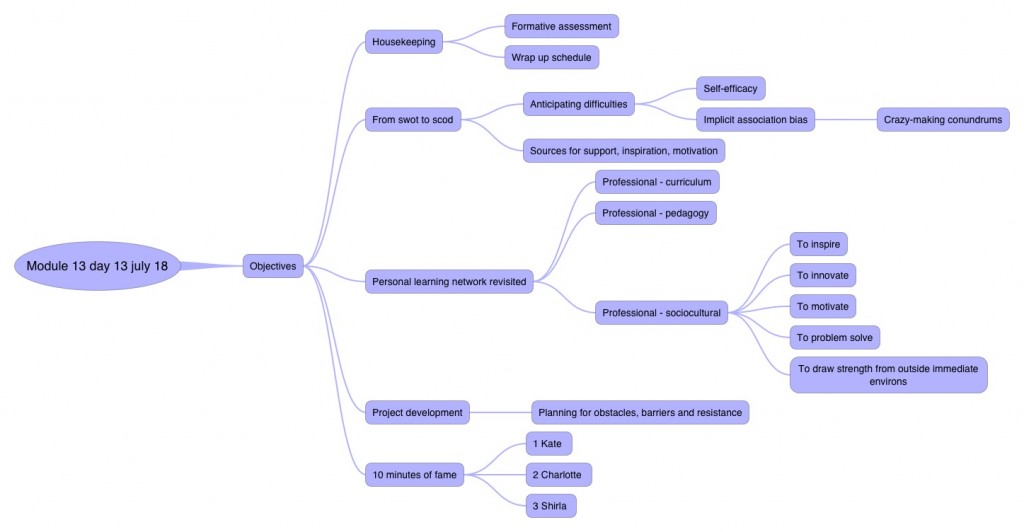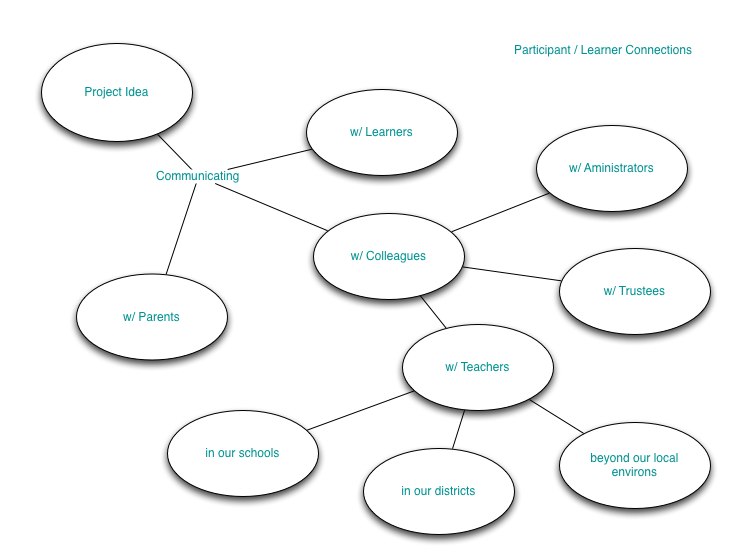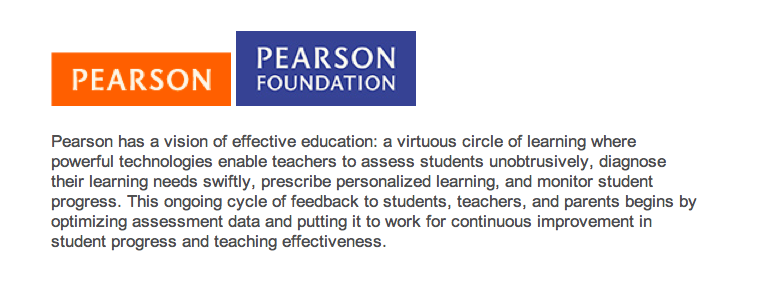Friday, July 19, module 14, day 14
How much did you write? 350 words x 14 posts = 4900 words + 10 minutes of fame and final project URL – an average book chapter is approximately 5,000 words – we just wrote the equivalent of 29 book chapters in 3 weeks including research – not to mention discussion forum postings and collaborative work
How much did I write in comments? 14 x 29 (406 comments) x 200 words (81,200 ((00)) words!!!!).
Folks – we have the makings of a full book manuscript in these blog posts – all about teaching, school libraries, technology and educational policy
Synthesizing the journey
1. Individual summaries
Post thoughts, ideas, and responses on the discussion forum for today
2. Where we go from here
Publishing – influencing public perceptions, building public knowledge and support
Presenting – influencing policy conditions (school, district, province, and beyond)
Knowledge generative networks – broadening perspectives; deepening understanding
Efficacious Ict communities of practice: inquiry-based pro d – question, research, discern, design, implement, deliberate, repeat
Thursday, July 18, module 13, day 13
Preparing for difficulties
Crazy-making? Consider implicit association bias
http://www.amazon.ca/Blindspot-Hidden-Biases-Good-People/dp/0553804642
Banaji, M. R., & Greenwald, A. G. (2013). Blindspot: Hidden Biases of Good People: Hidden Biases of Good People. Delacorte Press.
Blind spots – what we are capable of perceiving consciously
Blindsight – what we are capable of perceiving collectively
Self-efficacy
Bandura, A. (1982). Self-efficacy in human agency. American Psychologist, 37(2).
Personal learning network – planning for support
Wednesday, July 17, module 12, day 12
Thinking about using ict to enable, enrich, and enhance learning
Read and record impressions on discussion forum: iPads vs Teachers first impressions – thoughts and feelings arising from reading the article
Discuss and record comments on discussion forum critical inquiry – alternate lines of discourse about this phenomena
– identify false dichotomies, binary oppositions, propaganda speech
Re-cap final project vision (without referring to ict)
Re-cap final project participants and learner qualities and characteristics (include ict history, skills, confidence)
Identify ict devices, software applications, and network infrastructure ideally suited to support the project (enrich, enable, enhance learning and connectivity)
Identify pertinent policy conditions – provincial, district, school
Identify pertinent ict access conditions – devices, software, network
Design ict component – ict used singularly, ict used as composite unity (ie. email, website and blog; or digital cameras, Flickr, iPad drawing app, blog).
Design ict component of future vision project – who is doing what, when, with whom, and why
=========================================================================================
Tuesday, July 16, Module 11, Day 11
Thinking about Participants’ Learning – Qualities and Characteristics
Designing for Participants’ Learning and Connectivity
Monday, July 15, module 10, day 10
Shape of the week – course overview / putting ourselves on the timeline
Whole group check in – project development plans
Design based learning
Interest based groups – research design based learning
Discuss the relationship between design based learning and inquiry design
Explain how you are incorporating design based learning and/or inquiry based learning into your project
What are you hoping to accomplish with this design approach?
What role does visual literacy and visual language play in your design considerations? How are you accounting for that element in your design?
Visual literacy / visual language
12:10 4 x 10 minutes of fame
====================================================================
Friday, July 12, module 9, day 9
10 minute debrief – developing world libraries : school level and inquiry-based
Ted talk – sugata mitra hole in the wall project – kids teaching each other technology
Thinking about Developing World Libraries and kids teaching each other – is access to information a human right?
EBSCO, open educational resources, personal learning networks, network publishing
Creative Commons, content pay walls, educational access to educational content
=======================================================================
10 minute summative presentations
=======================================================================
10 minutes of fame
=======================================================================
Peer review review
=======================================================================
Thursday, July 11, Module 8, Day 8
Developing world libraries in the context of your topic inquiry:
What are the latest developments pertaining to world libraries? How do these developments impact our school libraries? What is our school library response to developing world libraries? How might developing world libraries relate to your topic inquiry this week?







 Follow
Follow
Some Notes from today…
Class thoughts – where we are now – upper most in our minds – 3 sentences…
• Being responsible to our students
• Final project needs direction
• ICT Vision statement needed for self & school
• Use of iPads in classroom
• Enjoying self exploring in class
• Role of library in inquiry based learning
• Student driven curriculum… peer teaching
• Promoting reading – via blogging
• ICT committee – need of policy, vision or mission statement
• Blooms Taxonomy & ICT handout blend
• Overwhelmed by amount of ICT out there
• Parents & communication – how to use ICT…
• Applicability of ICT
• Building community
• Classroom blog or website
• Professional Learning Network
• Connections to nature and people
• Revolution!
• Picking appropriate ICT for the class
• How to communicate with parents when not their full time teacher via ICT
• What does research say?
• Making world connections with ICT
• Movement of ICT… SMART boards to iPads… (Fad vs. research/plan)
• Reading levels of ICT (local & provincial info-resources)
• Disconnection in schools, only using ICT as tools, what is the purpose?
• How to teach the new literacies via social media?
• Learning Commons versus traditional library role
• Inspiration by “pintrest”
• Made for school library ICT!
Thanks for capturing these ideas, Jen!
No worries. It keeps my ADD & jet lag in check ;D JL
Leaving Letter Grades Behind?
Here is a link to Abbotsford School District, Superintendent Kevin Goddard’s latest post, where you can read further links or sign up to follow his Twitter acct.
http://www.sd34.bc.ca/blog/letter-grades-no-longer-make-grade-part-2
Here is the link to BC Education Plan blog (to engage in conversation about the revisions proposed to our provincial education system) http://engage.bcedplan.ca/
Doni
….also Maple Ridge may be leaving letter grades behind:
http://www.mapleridgenews.com/news/202620741.html
doni
In response to the TedTalks video by Sugata Mitra, from the UN Charter on the Rights of the Child (www.unicef.org)
Article 17
(Access to information; mass media): Children have the right to get information that is important to their health and well-being. Governments should encourage mass media – radio, television, newspapers and Internet content sources – to provide information that children can understand and to not promote materials that could harm children. Mass media should particularly be encouraged to supply information in languages that minority and indigenous children can understand. Children should also have access to children’s books.